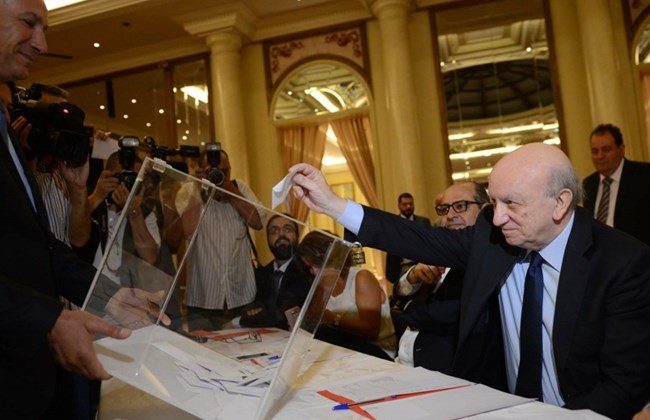March 14 elects National Council president
The Daily Star/June 28, 2015
BEIRUT: March 14 figures elected former MP Samir Frangieh as the head of the coalition’s National Council Sunday, in the first session for the group since the formation of the council was announced last March. Frangieh, a political writer and a former March 14 lawmaker from north Lebanon, won with a sweeping majority of 237 votes while his opponent Fawzi Farri only received 32. In a terse speech after his win, Frangieh said that the council aims to prepare for an “uprising of peace” that would allow Lebanon to exit the problems of the past and enter a future that is better for all the country’s citizens. Preparations for this “uprising” would require challenging the country’s “sectarian regression” by creating a civil framework that would surpass sectarian divisions, he said.
Working with civil groups and communicating with “forces of moderation and democracy” in the Arab world is another prerequisite, he added. Three hundred March 14 representatives met in Beirut’s Biel complex to elect a president and the heads of 14 specialized committees. The next meeting will be held in three months during which an executive council will be elected. Fares Soueid, coordinator of the March 14 Secretariat General, told Future TV Sunday that National Council is based on three pillars- freedom from sectarian restrictions, a democratic process and full transparency.“The March 14 National Council which gathers Christians, Muslims, Druze, Alewites and Armenians is the perfect response to the segregation of religions and faiths in Lebanon the Arab world,” he said.
The council, according to Soueid, will also work on founding a civil state that respects the rights of its citizens and seeks to separate religion from politics.
Samir Frangieh calls for ‘Intifada of Peace’
The Daily Star/June 29, 2015
BEIRUT: Former MP Samir Frangieh called Sunday shortly after his election as head of the March 14 coalition’s National Council on all Lebanese to participate in preparations for what he dubbed an “Intifada of Peace” to lay the ground for a better future for Lebanon.
“I call on all the Lebanese without discrimination to participate in preparations for an Intifada [uprising] of Peace that will put an end to past tragedies and lay the foundation for a better future for all of us,” Frangieh said. He spoke shortly after independent March 14 figures elected him as the head of the coalition’s National Council, in the first session for the group since the formation of the council was announced last March with the aim of developing the coalition’s political platform.
Frangieh, a political writer and a former March 14 lawmaker from north Lebanon, won with a sweeping majority of 237 votes out of the council’s 284-member constituent assembly, while his opponent Fawzi Farri received 32. There were 11 blank ballots and two empty envelopes, and two ballots were canceled. Roughly 350 representatives from all March 14 parties, including the Future Movement, the Lebanese Forces, the Kataeb Party, the National Liberal Party and the March 14 General Secretariat, met in Beirut’s BIEL complex to elect a president, a 14-member bureau and the heads of 14 specialized committees.
In his victory speech, Frangieh said preparations for the “Intifada of Peace” call for the creation of a modern civil framework capable of overcoming confessional and sectarian polarization. “They also call for working with civil groups that face all kinds of violence and discrimination and contacting forces of moderation and democracy in the Arab world that oppose extremism,” he said. Before his election, Frangieh told Future TV: “This council will revitalize the actual participation of independent public voices in determining the decisions of the March 14 coalition.”
The council will give a new push to the principles of the 2005 Cedar Revolution, which resulted in the ouster of Syrian forces from Lebanon, he added. The council’s constituent assembly will hold a new conference within three months to elect its executive office. A preparatory committee formed last March was asked to continue its mission in drawing up the National Council’s new bylaws and political platform. The committee’s members include MPs Marwan Hamadeh, Fadi Karam, Joseph Maalouf, Jean Ogassapian, Ahmad Fatfat and other officials and activists from factions affiliated with March 14. In an opening speech, former MP Fares Soueid, coordinator of the March 14 Secretariat General, said “March 14 independents” refer to those who voluntarily joined the “Independence Intifada” which laid the foundation for the March 14, 2005, movement that eventually led to the withdrawal of the Syrian army from Lebanon, ending nearly three decades of Syria’s domination of its smaller neighbor.
“The word ‘independent’ in the March 14 [coalition] means full and clear commitment to the March 14 cause without being affiliated with a party or subservient to a political leader,” Soueid said. Before the election, Soueid told Future TV that the National Council is based on three pillars – freedom from sectarian restrictions, a democratic process and full transparency.“The March 14 National Council which brings together Christians, Muslims, Druze, Alawites and Armenians, is the perfect response to the segregation of religions and faiths in Lebanon the Arab world,” he said. The council, according to Soueid, will also work on founding a civil state that respects the rights of its citizens and seeks to separate religion from politics.























